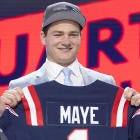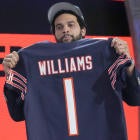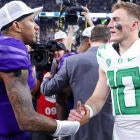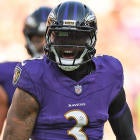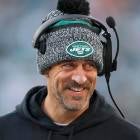Peyton Manning informed John Elway in a meeting on Feb. 13 that he is physically and mentally prepared to play the 2015 season. The quadriceps injury that hindered Manning toward the end of the 2014 season has healed. Although Elway publicly stated he wanted Manning back next season shortly after Denver's 24-13 loss to the Indianapolis Colts in the AFC divisional playoffs, there hasn't been any public reaction from the Broncos about Manning's intention to return.
Denver's silence has prompted speculation that the team isn't fully committed to Manning or is interested in him taking a pay cut. Manning is scheduled to make $19 million in 2015. His salary becomes fully guaranteed on the last day of the 2014 league year, which is March 9. The guarantee is subject to him taking a physical between the 15th day (Feb. 23) and fifth day (March 5) before the end of the 2014 league year.
2014 performance
The notion of a pay cut stems from the sharp decline in Manning's play toward the end of last season. How much the decline is because of father time catching up to Manning as opposed to the quadriceps injury he suffered in Week 15's contest against the San Diego Chargers is debatable. One thing that isn't debatable is the difference in Manning statistically during the first 12 games or three quarters of the regular season and the final four games or last quarter of the regular season. The chart below illustrates the difference.
| A tale of two Mannings | |||||||
| Games | Completions | Attempts | % | Yards | TDs | INT | Passer Rating |
| 1st 12 | 318 | 476 | 66.8% | 3737 | 36 | 9 | 107.8 |
| Last 4 | 77 | 121 | 63.6% | 990 | 3 | 6 | 76.8 |
| Season | 395 | 597 | 66.2% | 4729 | 39 | 15 | 101.5 |
Manning was magnificent while leading the Broncos to a 9-3 record over the first three quarters of the season. He was in the top five in passing yards (third in the NFL), touchdown passes (first), passer rating (second) and completion percentage (fourth). He was a shell of himself down the stretch. His highest ranking in these categories was 14th in passing yards. His six interceptions were tied for the second-most with Drew Brees. His passer rating was tied for 25th.
The quarterback market
The five-time NFL MVP's five-year, $96 million contract is consistent with the quarterback market. He is the fifth highest-paid quarterback by average salary. Manning could drop as many as five slots during the offseason since Andrew Luck, Cam Newton, Philip Rivers, Ben Roethlisberger and Russell Wilson could sign new deals. His $21.5 million 2015 cap number is third among quarterbacks. He only trails Tony Romo and Drew Brees, who have $27.773 million and $26.4 million cap numbers. Manning is also tied with Brees for the highest 2015 quarterback salary at $19 million.
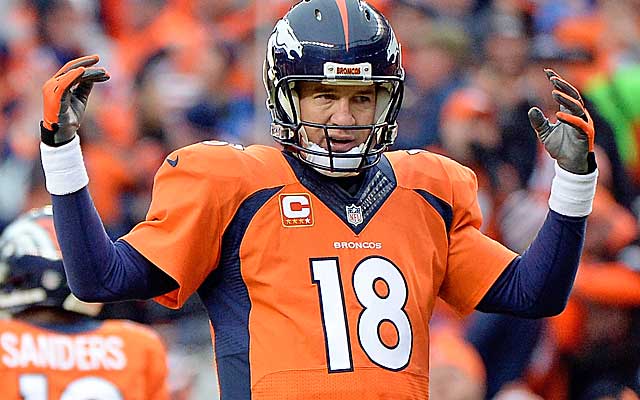
The Broncos are already getting Manning at a discounted rate because of how he handled negotiations after the Colts released him in 2012. Twelve teams reportedly inquired about Manning once he became available. He narrowed his choices down to four teams and picked his destination before negotiating a contract instead of letting Tom Condon, his agent, leverage the considerable interest, which reportedly included a $25 million per year offer from the Tennessee Titans, into his best deal.
This isn't the first time Manning has left money on the table. He declined to become the NFL's first $20 million per year player when Condon was negotiating his final Colts contract in 2011. Manning opted for a more front-loaded five-year deal that matched Tom Brady's $18 million per year average, which was tops in the NFL.
Taking a pay cut
There is a school of thought that Manning should follow in Brady's footsteps by playing under his market value to allow the Broncos to retain key impending free agents and surround him with more talent to maximize his chances for winning a second Super Bowl in the twilight of his career. Brady freed up $8 million and $7 million of cap room for the New England Patriots in 2013 and 2014 when he signed a five-year, $57 million deal or a three-year, $27 million contract extension (the value of his new contract years), depending upon how it's characterized, during a 2013 off-season renegotiation. Either way, he took a big hometown discount.
Brady recently took it one step further by giving up the skill guarantee of his $7 million, $8 million and $9 million base salaries in 2015, 2016 and 2017. In exchange, $1 million was added to each his base salaries for these years. Since there is only an injury guarantee left in each of the remaining years of Brady's contract, the Patriots aren't required to fund his guarantees. According to league rules, a team must place into an escrow account the amount of any skill guarantees in a contract. The change in Brady's contract gives the Patriots use of $24 million that wouldn't be available otherwise because of the funding requirement. This contract maneuver only frees up cash, not salary cap space. Brady is making $8 million in 2015.
Manning is in the best position financially of any NFL player to take a big pay cut. He has made $228.714 million from his NFL player contracts during his 17 NFL seasons. This is almost $75 million more than the $154,029,500 Brady has earned in 15 NFL seasons. One option could be including a not-likely-to-be-earned incentive that doesn't count against the cap for winning the Super Bowl equal to the amount of Manning's pay cut.
The Broncos have five offensive starters and three defensive starters among their 12 impending unrestricted free agents. That includes offensive guard/tackle Orlando Franklin, defensive tackle Terrance Knighton, free safety Rahim Moore, wide receiver Demaryius Thomas and tight end Julius Thomas. It will be difficult to retain most of these players with the $26 million of cap space the Broncos have (with a projected $142 million 2015 salary cap) and upgrade the offensive line, especially if it is necessary for the team to put their franchise tag on Demaryius Thomas. His franchise tag will be $12.708 million if the salary cap is $142 million.
Demaryius Thomas rejected an offer before the start of the 2014 regular season that would have made him the NFL's third highest-paid wide receiver according to Mike Klis of the Denver Post. This puts the offer somewhere between Percy Harvin's $12,843,500 new money average per year and below Calvin Johnson's and Larry Fitzgerald's deals averaging slightly more than $16 million per year and containing in excess of $45 million in guarantees. Julius Thomas was also reportedly offered a deal averaging between $7.5 million and $8.5 million per year that would have made him the NFL's third highest-paid tight end.
Denver doesn't have the leverage to force Manning to accept a pay cut because remaining a Super Bowl contender largely hinges on whether Peyton Manning is the quarterback. If Manning doesn't play in Denver next season, it could be reminiscent of Brian Griese taking over in 1999 after Elway retired. Manning's backup Brock Osweiler is an unproven commodity who has thrown 30 passes in his three NFL seasons. The Broncos may not drop to 6-10, as in 1999, but the team's four-year reign as AFC West champions would likely come to an end.
The best chance of getting a pay cut is by Manning instructing Condon to negotiate one if asked by Elway. The idea would get dismissed pretty quickly with Condon having discretion to decide what's in Manning's best interests. He would probably remind the Broncos that they were comfortable paying Manning $18 million in 2012 when there was even more uncertainty about how he would perform with his surgically-repaired neck.
Condon could suggest that left tackle Ryan Clady is a better pay cut candidate than Manning. Clady is scheduled to make $10 million in 2015 with a $10.6 million cap number. His $8.5 million 2015 base salary and $1.5 million 2015 roster bonus are fully guaranteed on March 14. Clady was Pro Football Focus' (PFF) 41st-ranked offensive tackle and 23rd in their pass blocking efficiency metric at the position in 2014 after missing all but two games during the 2013 season with a Lisfranc foot injury. Prior to the injury, Clady was PFF's fifth-ranked offensive tackle and fourth in the pass efficiency metric in 2012.
Condon might also point out that the Saints aren't asking Drew Brees, another one of his clients, to entertain a pay cut despite his $26.4 million cap number -- the same 2015 salary as Manning -- despite New Orleans having a $23 million cap overage, which must be addressed before the 2015 league year starts on March 10.
The Saints missed the playoffs with a 7-9 record while playing in the NFL's easiest division, the NFC South. Brees had a great season on paper. He tied for the league lead in passing yards (4,952) and was second in completion percentage (69.2 percent). Brees also fared well in advanced football metrics. According to PFF, he was their second-ranked quarterback in 2014. He also had a knack for turnovers at inopportune times that affected the outcome of games. Only two quarterbacks, Rivers and Jay Cutler, had more than the 17 interceptions Brees threw.
Contract restructuring
Restructuring Manning's contract could accomplish the same thing from a cap standpoint as a pay cut. Manning should be amendable to restructuring his contract, considering he did it twice while with the Colts. The problem is the Broncos haven't done any simple contract restructures for cap purposes during Manning's three years with the team. Denver can create $9.015 million in 2015 cap space if Manning's entire 2015 salary, except for his $970,000 league minimum, is converted into signing bonus. Manning's 2015 cap number would drop to $12.485 million but his 2016 cap number would balloon to $30.515 million. Up to three voidable years (2017 through 2019 contract years) could also be added to help with the bonus proration and create additional cap room. A maximum of $14.424 million in cap space can be freed up with this approach.
A more reasonable alternative could be a restructure creating the same $5 million of cap room the Denver Post's Mark Kiszla suggested with Manning cutting his 2015 salary from $19 million to $14 million. Under this scenario, Manning would still make $19 million but $10 million of his base salary would be converted to signing bonus to lower his cap number to $16.5 million. His 2016 cap number would become $26.5 million.
Releasing Manning
Manning would probably have no shortage of suitors if Elway went in another direction after a pay cut was refused. The Broncos would pick up $16.5 million of cap room by parting ways with the future first-ballot Hall of Famer. Manning would immediately become the cream of a weak free agent quarterback crop, which is headlined by journeyman Josh McCown, Brian Hoyer and 2009 first round pick Mark Sanchez, despite his age. He turns 39 on March 24.
The Houston Texans might have the most appeal to Manning. He was reportedly interested in the team after the Colts let him go. Manning wasn't pursued by the Texans because the team was happy with Matt Schaub at quarterback. He wouldn't have to worry about the elements affecting his performance because NRG Stadium is an indoor/outdoor facility with a retractable roof.
The Texans narrowly missed the playoffs in 2014 with nine victories. The seven-game turnaround from a league-worst two wins in 2013 was the NFL's biggest win improvement in 2014. The Texans could challenge the Colts for the AFC South in 2015 with a legitimate starting quarterback.
It would probably require some creativity to fit Manning under the cap, since the Texans have approximately $10.5 million of cap space with right tackle Derek Newton and cornerback Kareem Jackson headed toward free agency. Wide receiver Andre Johnson might be more receptive to taking a pay cut to lower his $16,144,585 2015 cap number with Manning on board. A deal stretching past the number of years Manning could reasonably be expected to play may be necessary to help with signing bonus proration to lower his 2015 cap number and provide him with an adequate salary.
The Chicago Bears would be the easiest transition for Manning. He has a great rapport with Bears offensive coordinator Adam Gase, who was Manning's quarterback coach in 2012 and offensive coordinator during his last two seasons (2013 and 2014) with the Broncos. Chicago's weather might be a negative for Manning because he is less effective when the temperature is low. Acquiring Manning would allow the Bears to trade Jay Cutler. The Bears wouldn't be on the hook for Cutler's fully guaranteed $15.5 million 2015 base salary if he could be moved. Logistically, it could be difficult depending on the timing of Manning's release. The trading period for 2015 begins when free agency starts on March 10. This wouldn't leave much time to deal Cutler before $10 million of his $16 million 2016 base salary becomes fully guaranteed on the third of the 2015 league year (March 12).
The New York Jets could also be intriguing to Manning. The team should enter free agency with at least $45 million of cap room. Money would be less of an object with the Jets. The team needs to spend because it is currently under the minimum spending requirement in the Collective Bargaining Agreement. Teams are required to spend 89 percent of the salary cap in cash over four year periods of 2013 through 2016 and 2017 through 2020. The Jets were 31st in spending in 2014 ($106.23 million) and are below the 89 percent threshold during the last two seasons at 84.5 percent. Winning free agency hasn't translated to enough victories to make the playoffs in recent years but the Jets have the ability to significantly upgrade the talent on the roster.
Two teams with an abundance of cap room and a need at quarterback might not be too appealing to Manning. The Cleveland Browns could probably contend in the AFC North with a better quarterback than Brian Hoyer or 2012 Heisman Trophy winner Johnny Manziel, who recently checked himself into a treatment facility. The franchise's dysfunction might make the Browns a tough sell to Manning despite having more than $50 million of cap space and owner Jimmy Haslam being a fellow University of Tennessee alum. The Titans are expected to have more than $40 million in cap room but are much further away from contending than they were in 2012 when Manning rejected them.
Outcome
It would be somewhat of a surprise if Manning isn't with the Broncos in 2015 even if any efforts to get him to take a pay cut fail. The Broncos won't necessarily need Manning to perform like he did for a majority of the 2014 regular season. He will need to play much better than he did in latter part of season if Denver is going to have a shot at winning Super Bowl 50.
Joel Corry is a former sports agent who helped found Premier Sports & Entertainment, a sports management firm that represents professional athletes and coaches. Before his tenure at Premier, Joel worked for Management Plus Enterprises, which represented Shaquille O'Neal, Hakeem Olajuwon and Ronnie Lott. You can follow him on Twitter: @corryjoel | You can email him at jccorry@gmail.com












